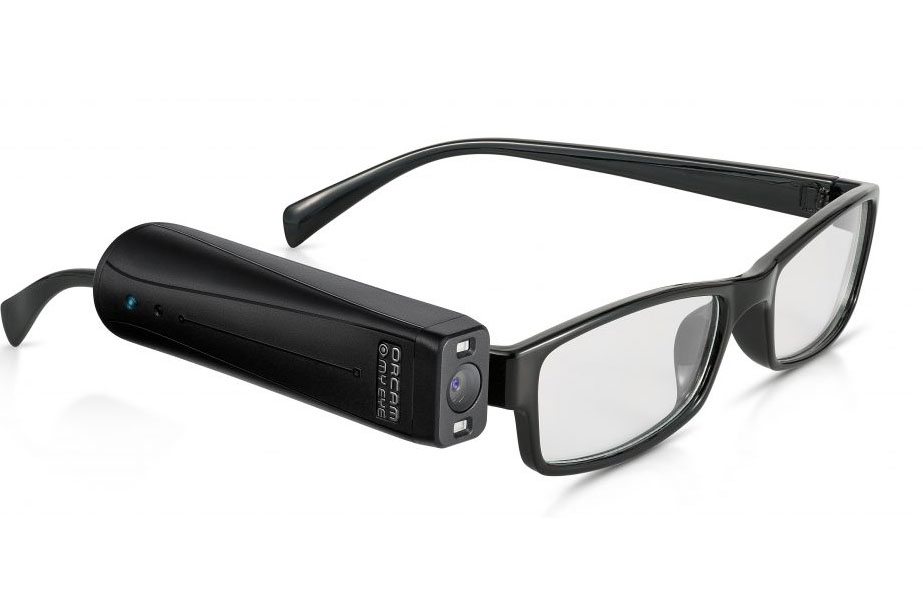For its countless technological innovations and contributions to the world, Israel has long been called a startup nation of great vision. Now, the Jewish state is doing something to help those who are blind or visually impaired.
On Jan. 9, the Maryland/Israel Development Center will present a talk by Mark A. Riccobono, president of the Baltimore-based National Federation of the Blind. Riccobono will discuss his recent trip to the Jerusalem headquarters of OrCam, which produces breakthrough assistive technology for individuals who are blind or visually impaired.
OrCam was invented by Amnon Shashua, co-founder of Mobileye, an Israel-based autonomous driving company that was acquired by Intel Corp. in 2017 for $15.3 billion and is used today in virtually every self-driving vehicle.
OrCam’s MyEye technology is wireless, lightweight and employs a magnet to clip to the frame of eyeglasses. It is a self-contained unit, working independently of the Internet, a smartphone or wireless connection.
MyEye reads consumer products, colors, money, newspapers and books, restaurant menus and signs, as well as computer and smartphone screens.

“MyEye does not enable a blind person to physically see his or her environment, but there is no one-to-one comparison of any other technology with it,” Riccobono said.
MyEye has a camera that takes photographs that are fed through its machine-learning algorithms as strings of numbers that can easily identify objects. It reports this feedback through a speaker that is next to the person’s ear using a text-to-speech engine.
OrCam technology can recognize faces and tell the user who is in front of him or her. This is particularly helpful for people with dyslexia and prosopagnosia, a neurological disorder commonly referred to as face blindness.
“OrCam seems to be embedded in a very strong culture of pride in Israel, with its headquarters there and use of Israeli talent,” Riccobono said. “OrCam is a unique company in the space of access technology for the blind and people with low vision.”
Once the technology is placed on an eyeglasses frame, the user activates it simply by pointing, for example, to the page of a book. Small LED lights can be used in dimly lit environments such as restaurants to read menus.
In addition to responding to hand gestures, MyEye can also follow the wearer’s gaze and relay feedback.
This hands-free source of real-time information provides blind and low-vision people with a new level of independence.
“OrCam is using the most advanced artificial vision technology to communicate vital visual information by audio — instantly, offline, discreetly,” said Motti Attai, OrCam MyEye’s regional manager. “OrCam has a large [research and development] team of more than 100 people who developed the hardware, the algorithms and the software specifically for this application. All the data processing is done on the device itself.”
OrCam began the R&D on MyEye in 2010, and the first product was introduced to North America in 2015. This extensive R&D investment resulting in OrCam MyEye 2.0 is reflected in its list price of $4,500.
Prospective users can contact their health insurance carrier to inquire about coverage, but it is unlikely for this assistive technology. In certain circumstances, however, government agencies can be helpful. For example, the Maryland Department for Rehabilitative Services, Independent Living Older Blind Program, might offer financial support or referrals to other funding sources.
In Baltimore, MyEye 2.0 is sold through the Johns Hopkins Hospital Wilmer Eye Institute. The Bethesda-based Envision Technology also offers this product. Free demonstrations are available, and one-on-one training is provided to new customers.
“Israeli engineers and entrepreneurs are excellent at applying their skills and imagination to develop practical solutions for real-world problems,” said Barry Bogage, MIDC’s executive director. “Nowhere is this seen more than in health care, sadly learned to treat wounded soldiers but also applied to the needs of people with disabilities such as blindness. We’re excited to be partnering with another Baltimore nonprofit, the National Federation of the Blind, to explore this aspect of Israeli technology.”
The MIDC event on Jan. 9 begins at 5:30 p.m., is free for MIDC members or $25 for non-members. It will be held at the headquarters of The Associated: Jewish Community Federation of Baltimore, 101 West Mount Royal Ave. For information, visit marylandisrael.org/home/events.
Peter Arnold is an Olney, Md.-based freelance writer.





